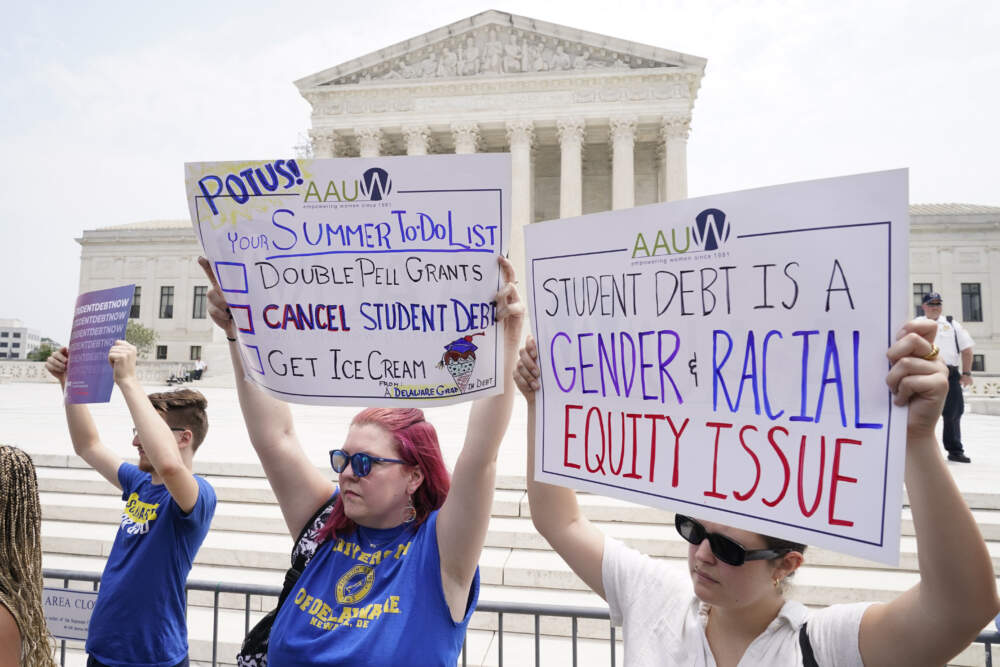Advertisement
'Disheartening and disappointing': Mass. borrowers react to Supreme Court student loan relief ruling

Shortly after the U.S. Supreme Court issued its ruling Friday striking down the Biden administration’s student loan forgiveness program, many student loan borrowers in Massachusetts said the decision was frustrating and disheartening.
"It just seems extremely unfair,” said Meghan Walsh, a Dorchester resident and Pell grant recipient who has about $20,000 of student debt. “The government was trying to do something good to help people and to have it be called illegal is bizarre.”
The 6-3 ruling from the court's conservative majority threw out Biden's $400 billion plan to cancel or reduce student loan debt, saying it exceeds his federal authority.
Walsh is one of more than 43 million Americans who would have been eligible for financial relief under the student loan forgiveness program. When Walsh left school, she had over $60,000 in student loans. Her $750 monthly payments have affected several areas of her life, including the career she chose after graduation and her ability to buy a house.
The student debt relief plan was first announced in August 2022. It would have erased $10,000 in student loan debt for people who make less than $125,000 annually (or $250,000 for married couples). Pell Grant recipients would have been eligible to get up to $20,000 in student loan debt cancelled.
About 16 million Americans were approved for some level of student debt relief before the legal challenges put the program on hold. In Massachusetts, roughly 800,000 people met income requirements to qualify for debt relief.
The Biden administration argued that student debt cancellation was legal under the HEROES Act, which allows the U.S. Department of Education to “waive or modify” provisions of the federal student loan program in the event of a national emergency.
But the court's majority said the plan was an overreach. "The authority to 'modify' statutes and regulations allows the Secretary to make modest adjustments and additions to existing regulations, not transform them," Chief Justice John Roberts wrote in his opinion.
Johanna Burke, a student loan borrower from Brighton who still needs to pay back $12,000 in student loans, said the decision wasn’t surprising.
"I was holding out hope that they would uphold this, but given the Supreme Court’s recent decisions and the makeup of the Supreme Court I saw this coming,” she said. “Especially given how much money for the government is involved.”
Advertisement
This decision lands shortly before student loans start to accrue interest again on September 1st. That marks the end of a roughly three-year pause on student loan payments and interest by the federal government due to the COVID-19 pandemic.
Several education organizations in Massachusetts responded with disappointment to Friday's ruling.
"With this unjust decision, student loan debt will continue to crush dreams and further reinforce inequities in our education system,” Vatsady Sivongxay, the executive director of the Massachusetts Education Justice Alliance, said in a statement.
The Massachusetts Teachers Association, the union representing about 113,000 teaching staff in the state, said ballooning student debt is linked to the current educator shortage in the state and the rest of the country.
“Student debt represents a failure of the government to support essential investments. We all benefit – especially in a place like Massachusetts – when more of our residents have access to public higher education,” said MTA President Max Page and Vice President Deb McCarthy in a statement.
According to the National Education Association, nearly half of educators around the country have outstanding student loan debt, carrying an average debt load of $55,000. According to the MTA, the student debt burden in Massachusetts and elsewhere falls more heavily on women and students of color.
Kyle McGee is a first grade teacher at Chelsea Public Schools and a resident of Waltham. She says her husband still has about $50,000 in student loans to pay down.
The loans have a significant impact on the family's budget. "His debt impacts my [finances] and additional debt, and it's just a lot of debt," she said.
McGee feels like she's stuck. In order to maintain her Massachusetts teacher's license, she must earn a master's degree, but she is anxious about the idea of accruing more debt.
"As a teacher I need this master's degree, but the payoff of having a master's degree is not substantial," McGee said.
This segment aired on June 30, 2023.
